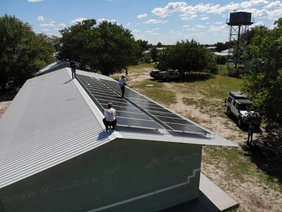In Namibia, more than half of the rural population has no access to electricity. Because of the long distances between the individual villages, connecting households to the national electricity grid is neither technically nor economically feasible. A German-Namibian project aims to remedy this situation. It is coordinated and controlled by Technische Hochschule Ingolstadt (THI).
Central to PROCEED, as the project is called, is the linking of technological, social, economic and ecological aspects of energy supply. After all, the lack of access to electricity is one of the biggest obstacles to poverty reduction and industrialisation efforts, as Dr Mathias Ehrenwirth says. He is head of building energy systems at the Institute for New Energy Systems (InES) and coordinates the technical work package of the project, which is being implemented together with the German company IBC SOLAR AG and Namibian partners on site. Also part of the project, with a stronger focus on socio-geographical and economic aspects, are researchers from the University of Bayreuth and the University of Applied Sciences Neu-Ulm.
Namibia faces particular challenges in the electrification of remote areas due to its low population density and a mostly sparsely distributed settlement structure. The solution: Island grids. The so-called mini-grids are to supply the people in rural areas with electricity from renewable energies.
Reliable operation of mini-grids is a challenge
The installation of such mini-grids is usually not a problem, but the long-term reliable operation of the systems is, as Dr Mathias Ehrenwirth reports. "A reliable power supply enables the settlement of small businesses, consequently the power demand of the settlements increases and the island grid - which cannot 'grow' to the same extent - reaches its technical limit." In addition, the batteries and modules age over time and lose their performance. The project wants to tackle all these problems in order to make the mini-grids more future-proof by taking various things into account during the planning stage. Ehrenwirth: "The stand-alone grids that will be built in the future should benefit from our experience."
That is why the research group was now on site in Tsumkwe and Gam (Namibia) - with a delay due to corona. After all, it is not only about the purely technical component, but also about political and social aspects, such as the possibility of state subsidy systems, the acceptance of mini-grids among the population or very practical questions about how electricity can be paid for. "Cashless payment methods are widespread in southern Africa. Our research project can also benefit from this infrastructure," reports Dr Mathias Ehrenwirth.
Ingolstadt University of Applied Sciences can rely on a long-established partner network in Namibia: for more than ten years, THI has been working in various projects with Namibian partners on a reliable power supply based on renewable energies in the South African country. "Our goal is to create something long-term and not to leave the local community to deal with it alone at the end of the project period," says the Ingolstadt researcher.
Further information is available at: www.thinknamibia.org.na/projects/proceed



![[Translate to English:] Logo Akkreditierungsrat: Systemakkreditiert](/fileadmin/_processed_/2/8/csm_AR-Siegel_Systemakkreditierung_bc4ea3377d.webp)








![[Translate to English:] Logo IHK Ausbildungsbetrieb 2023](/fileadmin/_processed_/6/0/csm_IHK_Ausbildungsbetrieb_digital_2023_6850f47537.webp)


